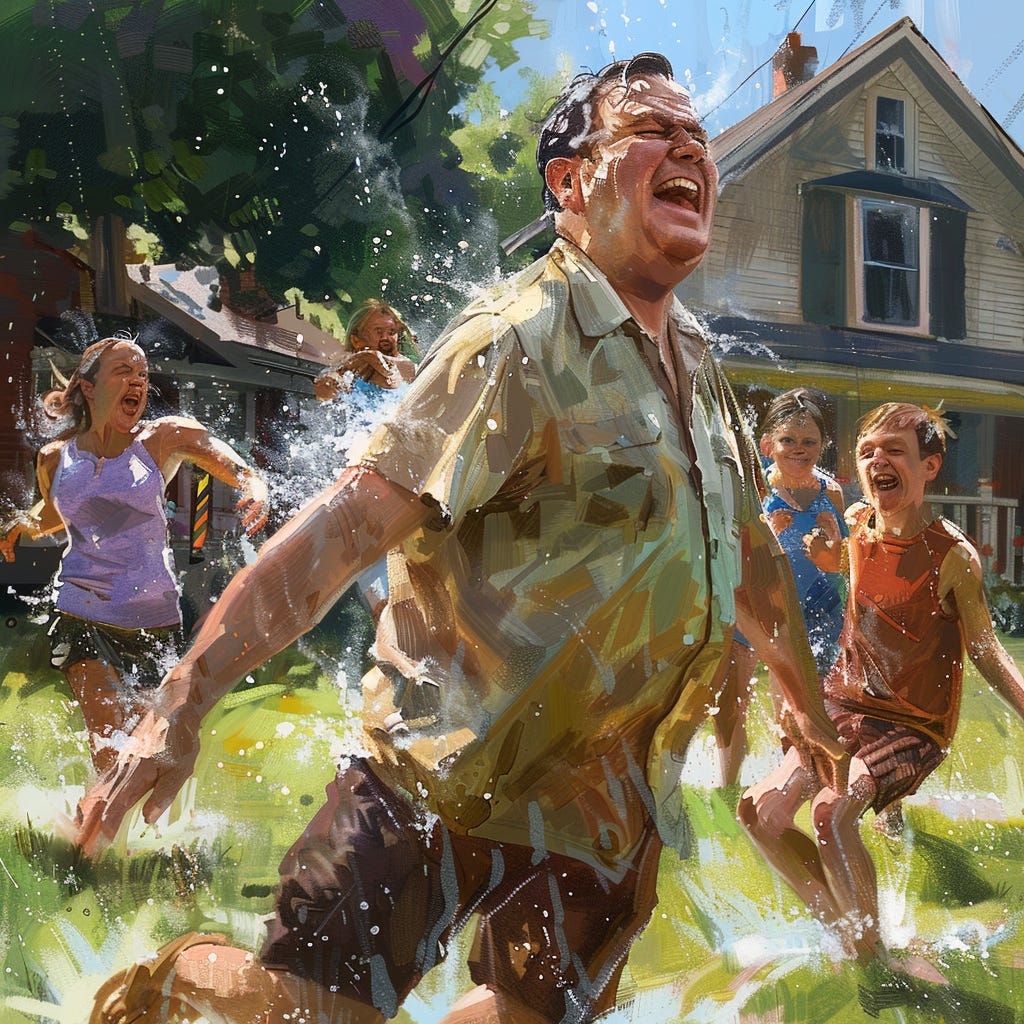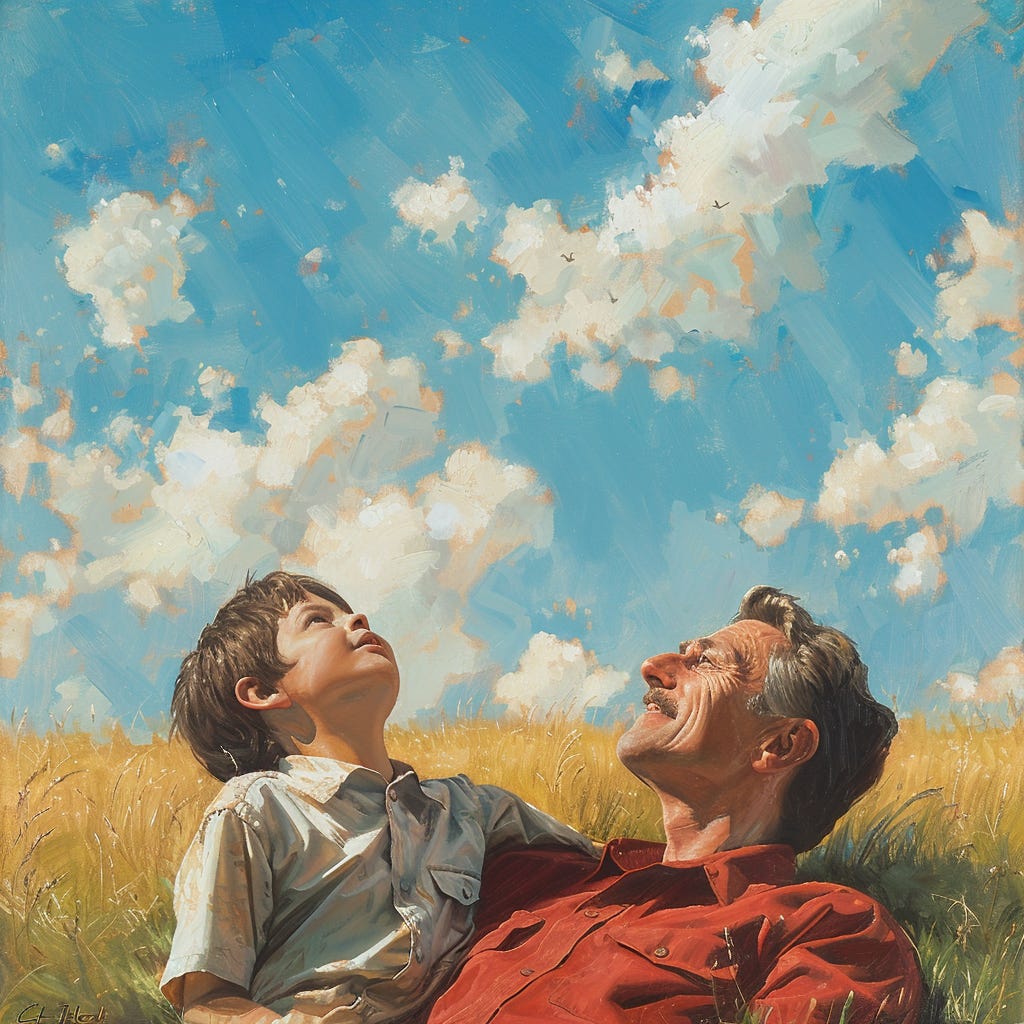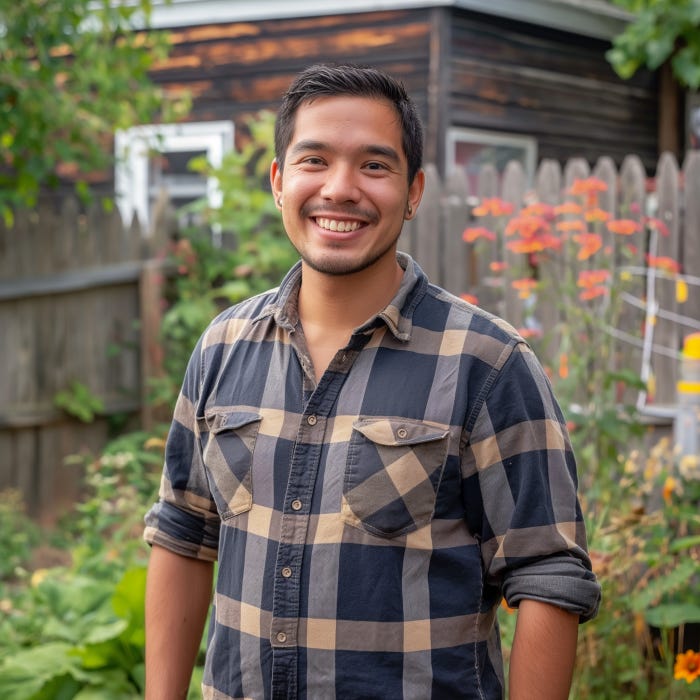A few nights ago, while my beautiful wife and sons were fast asleep, I went to our living room at midnight and sat on the couch in the dark. Even amidst the rainy Northeast night sky, I could see the grey clouds slowly floating…
Then, I burst into tears – dribble and spit falling from my mouth like a sick dog.
Periodically, I have these moments—nothing short of mini dams breaking, and little minuscule rememberings, as I like to think of them—slivers of silent time where I stop the manic pursuit of something more than what is and am reminded of how everything that feeds my soul is within these walls and in my tender heart.
The last few weeks have been inordinately challenging for me. My wife and I lost out on a big commercial directing job that I was sure we would win. When I feel like things aren’t working as I hope they are in my professional life, I up the ante, trying harder on other projects—indeed, compensation for some feeling out of control of the fate of my current work life. I push and push, going against the grain of friendly advice from peers and my iChing readings, which urge me to take a step back and reflect. All my intentions were good and straightforward, but I was being met with conflict for whatever reason.
As the tension rises, I am still somehow led by some daemonic internal force to what I need to see – a way of rebalancing me.
I had just come off a reverberating and touching first conversation with Mark McCartney, founder and creator of the What Is A Good Life? Podcast. We covered many topics, but what stood out was Mark’s sincere love and appreciation for small moments of presence and beauty – and his proclamation that he doesn’t need more than he has to feel fulfillment.
The conversation with Mark reminded me of a recent article by our mutual friend, Jindy Mann, entitled “Need.” In the brilliant little post, Jindy states:
Over the last few years, I’ve begun to think more and more about what I actually need. Do I need to buy something new? Could I repair something instead of replacing it? Could I get something second-hand? Could I borrow something?
Could I do without it completely?
This last question is usually where I feel the most resistance, and underneath that some desire or attachment I have. I now buy very little although I still own far more things than I need. - Jindy Mann
Outside of the desire to have more that is needed, I now find myself faced with a more precise and more apparent internal dilemma:
Can I become myself and express myself distinctly – allowing myself to enter the depths of the creative fire – while also being a present, loving, and dutiful husband and father?
Is being constantly present to my family's and home's needs - the domain of domesticity – thwarting my wildness?
Can I serve both gods—the gods of wildness and domesticity—and doesn’t my family deserve both sides of me?
If I’ve learned anything over the last few years in intensive Jungian analysis, it’s that whenever these dual opposing forces appear in a seemingly insurmountable way, the psyche is wishing for me to hold the tension between the two – hopefully, for a new third way to appear.
As I began to contemplate this tension, another new friend, Pranay Sanklecha, a Philosopher based in Berlin, posted a new article of his own called Meaningful Work. Recently becoming a father again, Pranay reflects:
“We also truly need some things of the spirit - some love, some beauty, some laughter.
Are these easy to obtain? Under normal circumstances, yes, I think they would be - but only if we were able to restrict ourselves to seeking the things we truly need. But we are not able to do this.
We waste our energies on things we don't truly need, and we inflict great troubles on ourselves in the pursuit of those unnecessary things, and so we make it harder for ourselves to enjoy love and beauty and laughter.
We chase things we don't need and ignore the things we do.
Food, some clothes, some shelter. A clean bum and a dry diaper.
Love, giving it, receiving it. The hundreds of times a day that we laugh together. Anaya's eyes. Rahi's calves, plump with life and the full-cheeked splendour of being two years old. Annika after she gave birth. The sacrifices she makes for me, the sacrifices I make for her.” - Pranay Sanklecha
Perhaps this tension of seemingly opposing forces - has a middle way that brings the duality together.
As I reflect on Jindy’s work, Pranay’s beautiful article, and my conversation with Mark, a burst of creative energy has beckoned on my door – and a strange sense of danger. I have begun to imagine the idea that, in our egregiously materialistic, capitalistic world, humans in this kind world must despise themselves for this type of culture to survive. We are urged to conform and forget our wildness. In essence, capitalism thrives in excess and the internal divide of the human being. We despise our meaningless lives, we dislike who we are deep down, so we buy things to cover the dread. Moreover, when the internal divide shreds apart our health and well-being, the Big Medical Industrial Complex is there to profit from our self-hatred. We are conditioned to hate what we are – that is how the system of capitalism grows and profits. In short, our modern world profits from our pain.
This got my blood to boil – akin to the blood coming out of the elevator in The Shining – the famous Stanley Kubrick film starring Jack Nicholson. The third way of the two opposing forces I mentioned earlier began to arise.
As I began to write down these thoughts furiously, a roar came up within me, and I began to imagine myself, and these wonderful other three men, as a different kind of man. A man I am calling…
The Sovereign Simpleton.
This Sovereign Simpleton, a new masculine archetype birthed from the collective unconscious, is a very specific type of man – a man who radically accepts himself, who embraces the mediocre-ness of his life, who finds power in simplicity and doesn’t fall for the illusive propaganda of a caricatured-capitalistic society.
The Sovereign Simpleton is the most intensely disobedient man – the most rebellious kind of lad. He recognizes the very conditioning that he has received – to hate himself is to benefit those in power. He actively and consciously suffers inwardly, to find the treasure of peace that lay in the still, wondrous longings of what beats in his chest. You see, to treasure what he is, to live from this center, is the biggest middle finger to the establishment. A man who lives in this wild center is untouchable by the mirage-making tyrants. Because he has found a way to stop chasing more than his basic needs, he is truly uncontrollable.
Moreover, this kind of man may live simply, but he is no dummy. He has read the great philosophers, poets, and psychologists – he reflects extremely well and thinks at a critical level far beyond what public education is willing to teach him.
He serves his community, as a bridge-builder, because he knows that powerful people attempt to break communities down, to find out how they can profit off the division and decay.
He offers a quiet strength of wisdom and compassion. His journey of self-liberation poses a threat to the very foundations of a capitalist society that thrives on conformity and control.
He doesn’t need to be financially rich, nor is he abdicating the fact that he needs money to support his family and loved ones. His employment doesn’t necessarily represent his identity, and therefore he doesn’t need to achieve more professionally for his sense of self-worth. His ambition centers around people – not profit.
He chooses to live in the present moment, not in a hoped-for better future. He is playful, and self-deprecating, and embraces his silliness and quirkiness in all of his human interactions.
The Sovereign Simpleton is your most average man. Average clothes, average looks, average car, average house – his average-ness makes him more undetectable and unpredictable. However, he knows that what is in his heart is not simple – it is not greying, numbing, or distracting like what mainstream culture promotes – what is in his heart is gold for him to give away. The thing is, the gold within this eye of the storm, never runs out – because it is connected to the divine – outside the control of the oligarchic cronies.
This man sees that most citizens wish to still be fed by the umbilical cord that runs from the flatscreen TV straight to their eyeballs – straight to their souls. That’s fine for them, but he knows that form of nurturance is poisonous, and it no longer helps him grow.
Most importantly, his disobedience is civil – he doesn’t incite riots, he is not violent, and his agency and authority are in his calm, compassionate potency of heart-centered giving.
“Finding the center of strength within ourselves is in the long run the best contribution we can make to our fellow men. ... One person with indigenous inner strength exercises a great calming effect on panic among people around him. This is what our society needs — not new ideas and inventions; important as these are, and not geniuses and supermen, but persons who can "be", that is, persons who have a center of strength within themselves.”
― Rollo May, Man's Search for Himself
I began this article by discussing these periodic moments of grieving and weeping that I do in the dark of my living room. When the grief arises, it isn’t a feeling of loss, but of sensational beauty. My life is unbelievably rich and full as it is. Yesterday I shot a basketball, threw a frisbee, and laid in the grass cloud-watching with my oldest son for no less than five hours. As we watched clouds, my oldest son, six – said, “This is just really awesome.” Cloudwatching – it’s free. Later in the day in the car with my youngest son, aged five, we were just discussing things outside the window as we would drive. “I’m having a really good time with you, Dad,” said my son.
Accepting who we are as men, what our lives are, and the people in it – it is truly the most radical form of resistance.
To embody the Sovereign Simpleton archetype – we must shift our general modal existential principle of the need “to have,” to the desire “to be.”
Being in a world preaching having is indeed a fight worthing fighting.
For the Sovereign Simpleton man, this is just the beginning.
“In the muted uproar of the world, he moves—
The Sovereign Simpleton, a silent killer of conformity,
Slashing through veils of gilded falsehoods with truths unsheathed.
He walks, a quiet tempest, a rebellion in repose,
Defying the clamor of capitalist dreams with whispers of existential prose.
Not clad in riches, nor armored in fame,
His wealth lies in the heartbeat of his name.
In lanes where shadows of oligarchs loom,
His simplicity dances, a defiant bloom.
With every step unchained, every breath a defiance,
He crafts from silence a radical alliance.
Against the din of a world frenzied and fast,
He is the slow pulse of a future recast.
In the marketplace of souls, where most barter their essence,
He guards his like a sacred presence.
A heretic in the church of perpetual more,
He owns his nothingness, rich at the core.
The Sovereign Simpleton, a paradox profound,
In his ordinariness, the untamed is found.
A silent killer, with no blood on his hands,
Just the power of a man who truly understands.
In the eyes of the empire, he’s naught but a ghost,
Yet in the theatre of the absurd, he’s the host.
Guiding with the lamp of an inner sun,
He’s the unsung hero, the insurgent one.
So let the oligarchs in their towers conspire,
For the Sovereign Simpleton’s aim is higher.
In the simplicity of his radical stance,
Lies a life in rebellion, a silent, profound dance.” – Source Unknown
-David B. Godin
Sources:
Rollo May
Pranay Sanklecha
Jindy Mann












"His journey of self-liberation poses a threat to the very foundations of a capitalist society that thrives on conformity and control."
Just brilliant David. This, the consistent invisible disobedience, is the silent revolution we need. As the great Gil Scott-Heron said, it won't be televised, it'll happen in our minds and souls.